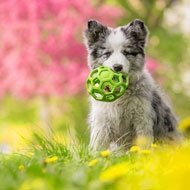
Results will provide insights into the evolution of social behaviour
Researchers at the University of Bristol are seeking dog owners to take part in a new study on pets’ attachment to toys.
The study will focus on the emotional attachment of dogs to specific toys - similar to the way babies and toddlers develop strong attachments to soft toys and blankets.
“Attachment objects provide a sense of comfort and security for children for whom these objects are irreplaceable,” explained Bruce Hood, professor of developmental psychology in society. “Children often treat their attachment object as if it has thoughts and feelings.”
Previous research suggests that around 60 per cent of Western children form emotional attachments to blankets and soft toys. Interestingly, studies also show there are much lower levels of childhood attachment to objects in the Far East.
Studies have also revealed that not all young children form emotional attachments to specific toys. Recent research of twins revealed that ownership of toys is half to do with genes and half linked to the environment. This is particularly true for the children who spent more time away from their mothers.
“Strong attachments to particular objects have been reported anecdotally by dog owners,” added Dr Emily Blackwell, director of companion animal population health at the Bristol Veterinary School. “This study is the first large-scale systematic survey of the phenomenon.
"The results will provide fascinating insights into the evolution of social behaviour in both dogs and their owners alike.”
For more information about this study and other dog science research visit www.dogsciencegroup.org



 RCVS Knowledge has welcomed Professor Peter Cockcroft as editor-in-chief for Veterinary Evidence.
RCVS Knowledge has welcomed Professor Peter Cockcroft as editor-in-chief for Veterinary Evidence.